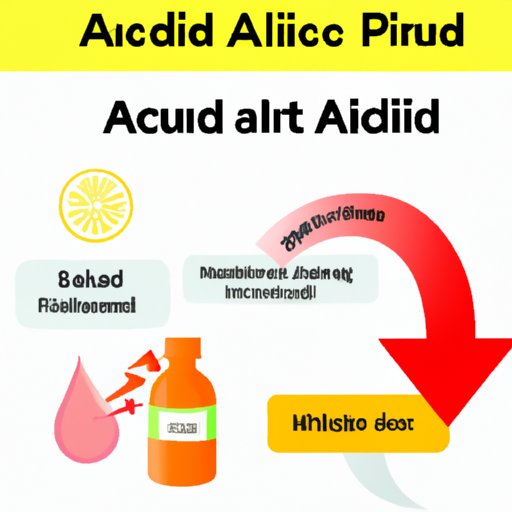Treating Acid Reflux: How to Alleviate Symptoms and Improve Your Quality of Life
If you’ve ever experienced a burning sensation in your chest or throat after a big meal or lying down, you might have acid reflux. Acid reflux is a condition that occurs when your stomach acid flows back up into your esophagus, causing discomfort and irritation. It can range from a minor inconvenience to a chronic condition that affects your daily life. In this article, we will discuss the main causes of acid reflux, common symptoms, and various treatments, including lifestyle changes, medications, and natural remedies.
What is Acid Reflux: Symptoms and Causes
Acid reflux is a condition that occurs when stomach acid flows back up into the esophagus. It can happen due to various reasons, such as a weakened lower esophageal sphincter (LES), which is a ring of muscle at the bottom of the esophagus that usually closes after food passes through. When the LES doesn’t close completely, it allows stomach acid and other digestive juices to flow back up into the esophagus, causing irritation and inflammation.
Common symptoms of acid reflux include:
- Heartburn, which is a burning sensation in the chest
- Regurgitation, which is when stomach contents come back up into the mouth
- Burping
- Nausea
- Bloating
- Coughing or wheezing
The causes of acid reflux can vary from person to person. Common triggers include consuming certain foods or beverages, such as caffeine, alcohol, acidic, and spicy foods. Eating large meals, lying down after meals, and smoking can also contribute to acid reflux.
Lifestyle Changes to Alleviate Acid Reflux Symptoms
Lifestyle changes can help reduce the symptoms of acid reflux and prevent it from occurring. Here are some tips to help you manage your acid reflux:
Reduce Caffeine and Alcohol Intake
Caffeine and alcohol can stimulate the production of stomach acid and irritate the lining of your esophagus. It’s best to avoid or limit these drinks to manage your acid reflux.
Quit Smoking
Smoking can weaken the LES and increase the risk of acid reflux. Quitting smoking can improve your overall health and reduce symptoms.
Avoid Acidic and Spicy Foods
Foods that are high in acid, such as tomatoes, oranges, and lemons, can exacerbate acid reflux. Spicy foods can also increase the risk of heartburn and reflux. It’s best to avoid or limit these types of foods if you’re prone to acid reflux.
Incorporate Healthy Eating Habits
Eat smaller, more frequent meals instead of large meals. Chew your food thoroughly and take your time while eating. It’s also best to avoid lying down immediately after eating. If you’re overweight, losing weight can help reduce the frequency of acid reflux episodes.
Medications for Acid Reflux
If lifestyle changes alone aren’t enough to manage your acid reflux symptoms, various medications are available to help alleviate symptoms. Here’s an overview of different types of medications:
Antacids
Antacids are available over-the-counter (OTC) and can provide quick relief for heartburn symptoms by neutralizing stomach acid. Popular brands include Tums, Rolaids, and Mylanta.
H2 Receptor Blockers
H2 receptor blockers help reduce the production of stomach acid and are often used to treat mild to moderate symptoms of acid reflux. Popular brands include Pepcid and Zantac.
Proton Pump Inhibitors (PPIs)
PPIs are a type of medication that helps reduce the amount of acid produced by the stomach. They are effective in treating moderate to severe symptoms of acid reflux and are available by prescription only. Popular brands include Nexium and Prevacid.
Natural Remedies for Acid Reflux
Natural remedies can also help provide relief for acid reflux symptoms. Here are some popular remedies:
Ginger
Ginger helps reduce inflammation and can soothe the esophagus. Drink ginger tea or add fresh ginger to your meals to help alleviate symptoms.
Apple Cider Vinegar
Although it seems counterintuitive, apple cider vinegar can help reduce heartburn symptoms by balancing stomach acid levels. Add a teaspoon of apple cider vinegar to a glass of water and drink before meals.
Aloe Vera Juice
Aloe vera juice can help reduce inflammation in the esophagus due to its anti-inflammatory properties. Drink a quarter cup of aloe vera juice before meals to help soothe acid reflux symptoms.
When to See a Doctor
If you experience acid reflux symptoms more than twice a week, it’s time to see a doctor. They can diagnose your condition and offer appropriate treatment options. Here are some red flags to look out for:
- Chest pain or tightness
- Difficulty swallowing
- Vomiting
- Bloody stools
- Anemia
- Weight loss without trying
Depending on the severity of your condition, your doctor may recommend lifestyle changes, medications, or surgery to manage your acid reflux.
Conclusion
Acid reflux can be a difficult condition to manage, but with the right treatment, you can alleviate symptoms and improve your overall quality of life. Lifestyle changes, medications, and natural remedies can all help reduce symptoms and prevent acid reflux from occurring. Don’t hesitate to seek medical help if your symptoms persist or worsen.
If you need additional information or support, consider reaching out to organizations such as the American Gastroenterological Association or the National Institute of Diabetes and Digestive and Kidney Diseases.
